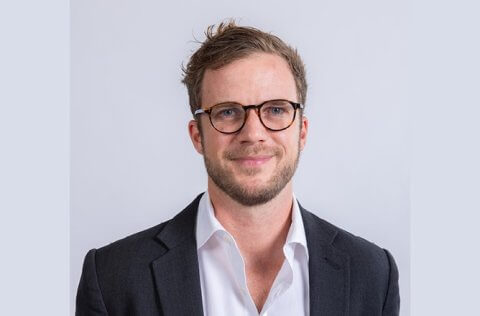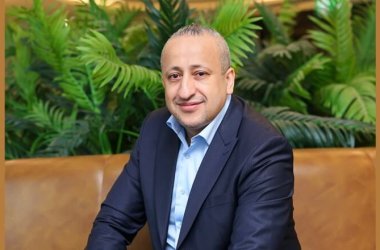CNME Editor Mark Forker sat down with Matt Spriegel, Co-Founder and CEO of Atiom, to find out more about the company’s inception, the positive and transformative impact the AI-powered platform is having on frontline workers in hospitality – and the opportunities emerging within the hospitality and aviation sectors across the Middle East region.

Matt Spriegel is a US tech entrepreneur, that is currently the Co-Founder and CEO of Atiom.
Atoim is a technological behavioural change platform that has established itself as a transformative force in the world of frontline team engagement, learning and performance.
Atiom was formed in 2017, and under the visionary leadership and direction of Spriegel, the company has gone from strength-to-strength and now has a solid market footprint across 5 continents.
The AI-driven platform is designed to help organisations to leverage the power of AI to ultimately enhance guest experiences, whilst at the same time increase employee productivity.
CNME managed to secure an exclusive interview with Spriegel to find out more about the company, the success it has had, and it’s plans for future growth, particularly in the Middle East marketplace.
However, the conversation began by us going back to the very start and determining what where the driving factors that led to the inception of Atiom.
The beginning of Atiom can be traced all the way back to when a youthful and exuberant Spriegel, who has always had an appetite for travel, deciding to go to China following the completion of his third-level education from Allegheny College.
“After I graduated from college about 19 years ago, I got a one-way ticket to China. I went there to learn Mandarin, but I was a lazy student, so I wanted to find out what was the easiest way to do this. I initially used some Open Course Ware MIT, and some Anki flash cards, which is an open-source flashcard application. Every day I’d spend about 5-10 minutes trying to teach myself Chinese, and I repeated this exercise for the best part of 12 months,” said Spriegel.
The self-learning adopted by Spriegel was effective, and it resulted in him getting a job at a large multinational company that was based in Shanghai.
He was one of only two foreign sales reps working for the company, and with a degree in Economics and Philosophy, he felt a little bit under-qualified and out of his depth in his new role.
“They certainly threw me in at the deep end, as I was tasked with the responsibility of selling medicine to Chinese healthcare professionals. I did the job long enough to reach the conclusion that healthcare was not my vocation in life. I then moved across to the agency side for a few years, and part of that job meant we had to spend 8 hours a day for 8 days in-a-row listening to a teacher speaking Chinese off PowerPoint slides. The teachers looked like they were going to pass out, and it was intense on us as students, and it became obvious to me that the system was broken,” said Spriegel.
This slow, archaic and gruelling learning experience ultimately led to Spriegel to search for new ways that could transform the methods and approach taken when learning a new language in the context of a business setting.
His search for a solution would create the first building blocks in the foundation of Atiom.
“As I said it was clearly a broken system. They gave us 500 PowerPoint slides to review two days before our training commenced. What I proceeded to do was map it all out on Mind Maps and turn it into flash cards. Now, I was by no means exceptional at my job, and I was lost in translation most of the time, but it gave me enough knowledge to do my job. However, the entire experience really planted the seed for Atiom. I wanted to formalise a way where I could take these bite-sized frameworks that I used to learn Chinese and apply it into the corporate world. I reached out to people I knew at companies like L’Oreal and Nike, and they said they received the same type of linguistic classroom training, and then it really dawned on me that there was a huge opportunity here,” said Spriegel.
Spriegel highlighted the impact of its first product and said the primary objective of its technology was to empower employees that he described as ‘forgotten’.
“We took 1,000 SOPs from a hotel, and we’d upload them into our system and create these bite-sized training modules with a gamification overlay. The gamification and bite-sized frameworks is still at the core of what we do, but we have now evolved to a full suite of products, and we’ve got quality assurance. Atiom is a behavioural change technology that is designed to create positive habits for the forgotten workforce of frontline staff in a bid to help them become happier, smarter and more productive at work. We believe that we can bridge the gap that exists between HQ, regional offices and the frontlines, because we know that frontline workers do not receive the same level of love that white collar and front-desk workers receive,” said Spriegel.
The business approach that has been adopted by Spriegel and his executive leadership team has been phenomenally successful to date, with Atiom now operating in 70 countries.
Some of Atiom’s clients include major global hotel groups such as Accor, IHG and Minor.
“We work with about 2,500 hotels, and the hospitality sector is undoubtedly our key focus area. We also work with Compass Group, and two months ago we launched with Etihad Airways. They want their cabin crew to deliver the same level of customer service as five-star employees. The aviation sector does appear to be the next big industry vertical that we are going to be entering, but hotels are our bread and butter,” said Spriegel.
Spriegel was keen to stress that Atiom does a lot more than just training – and emphasised why they call what they do behavioural change technology.
“When we go in now to work with businesses, we’ll do a complete diagnosis using our auditing tool. We will determine where the service gaps are across all the different departments, whether it’s in relation to cleanliness, housekeeping, breakfast service or the front desk, we need to know where the gaps are. And, then we take that diagnosis and we build playbooks, which is not just training. It’s a holistic approach to drive performance. Training is still in many ways at the core of what we do, but it isn’t everything that we do,” said Spriegel.
Like all startups, Atiom needed a ‘big break’ and that came in the form of its ongoing partnership with French hospitality behemoth Accor, who have over 5,000 hotels in 110 countries worldwide.
“When it came to selling the platform, it was difficult initially as we were selling to individual properties and general managers. However, we made our big breakthrough by on-boarding Accor as a client. We sold to their regional hub in Asia, that was based out of Singapore, and they put us in 350 hotels across six countries. They brought us to the Pacific, and then China where we started Atiom, and then into the Middle East. Once we got Accor, there was a domino effect and 3 months later we signed a deal with IHG, and then six months ago we signed with Minor Group, who are headquartered in Thailand, but covers all of Asia and the Middle East,” said Spriegel.
Spriegel added that the approach adopted by Atiom was very customer-centric once a client is onboarded on their platform.
“We’re not just giving them the technology and saying to them good luck. We have customer success’ teams that meet with the teams every single week to discuss best practices and examine what’s going well and what’s not going well. We don’t just say ‘here’s the technology, here is the cost and we’ll check-in with you again in 12 months for renewal’ – that’s not the way we operate. The customer centricity that we deliver is another factor in the success and scale that we have enjoyed thus far,” said Spriegel.
It is evidently clear that the technology provided by Atiom has bridged the gap that has traditionally existed between frontline workers and management, who often felt isolated and unappreciated.
However, with employee experience now high across the board in the chain of hotels where Atiom are present, it has rather naturally driven customer experiences to go in an upward trajectory.
“We are always increasing our training hours, but our customer success team will identify business cases. So, for example if we are with an operations team then we will be focusing on how we increase guest services and guest experience scores. If it’s with the commercial team then we will be looking at new loyalty sign-ups, or upselling. We have several case studies where we have helped double our upselling and loyalty sign-ups. We also have a case study where after just 3 months we have seen an increase of 5% in guest services and guest scores. These are metrics that we are integrating more in real-time with the clients. We haven’t lost a hotel in 6 years because they see that impact, and the tools and features are not the selling point. The selling point is us telling them that we can help them drive loyalty, drive service and drive upselling – and that’s what the business side of the organization is interested in, and that’s why we usually try to sell to the business side, rather than the HR training and development side, because they too tend to be more generalists,” said Spriegel.
The level of investment across the Middle East over the last number of years has been incredible.
However, the sheer scale of investment in the KSA is unprecedented.
The country wants to be a global leader in technology and diversify its economy in a bid to reduce its dependency on oil.
A big part of its economic reforms is making the Kingdom of Saudi Arabia a tourist hotspot, as a result there is a scramble to build hotels at scale across the country.
“You can see with the mega projects underway across the Middle East that there is this race to open as many hotels as possible, but you need skilled people in those seats. There are a lot of people who haven’t worked in hospitality, so you need to get upskilled and up to speed quickly. If a new hotel opens, and you’ve got 5 reviews and one of them is a bad review then you’re already working off the back foot, so there is no room for error. I think the investment and the infrastructure are in the KSA, but I do think the people are still relying on what I would describe traditional methods, such as pen and paper, face-to-face and learning management systems to try and get the staff up to speed. However, unless they have access to something everyday where they can search for information, do quizzes, engage in peer-to-peer support, knowledge checks and performance checks then you simply can’t do it fast enough,” said Spriegel.
Spriegel believes there are many key differentiators that give Atiom the edge in the competitive market that they operate in.
“There are many key differentiators that help us standout from the crowd, but I’d say the No.1 is our gamification frameworks. If you look at cross-learning management systems, their content-first platforms, whereas we are tech-first. Our CTO is incredible, and we call him the gamification guru because he makes safety and compliance training fun. The other element in our success would be our holistic approach to performance. You can’t just rely on 30-minute videos and some Q&A checking boxes, you need to reinforce the behaviour, and that’s where Atiom is very strong in my view. My favourite tool is peer-to-peer recognition because it takes 5 minutes to set-up, and people love to be recognized, and they love to recognize others. It helps them, it helps staff, and it shows everyone what good behaviour looks like,” said Spriegel.





